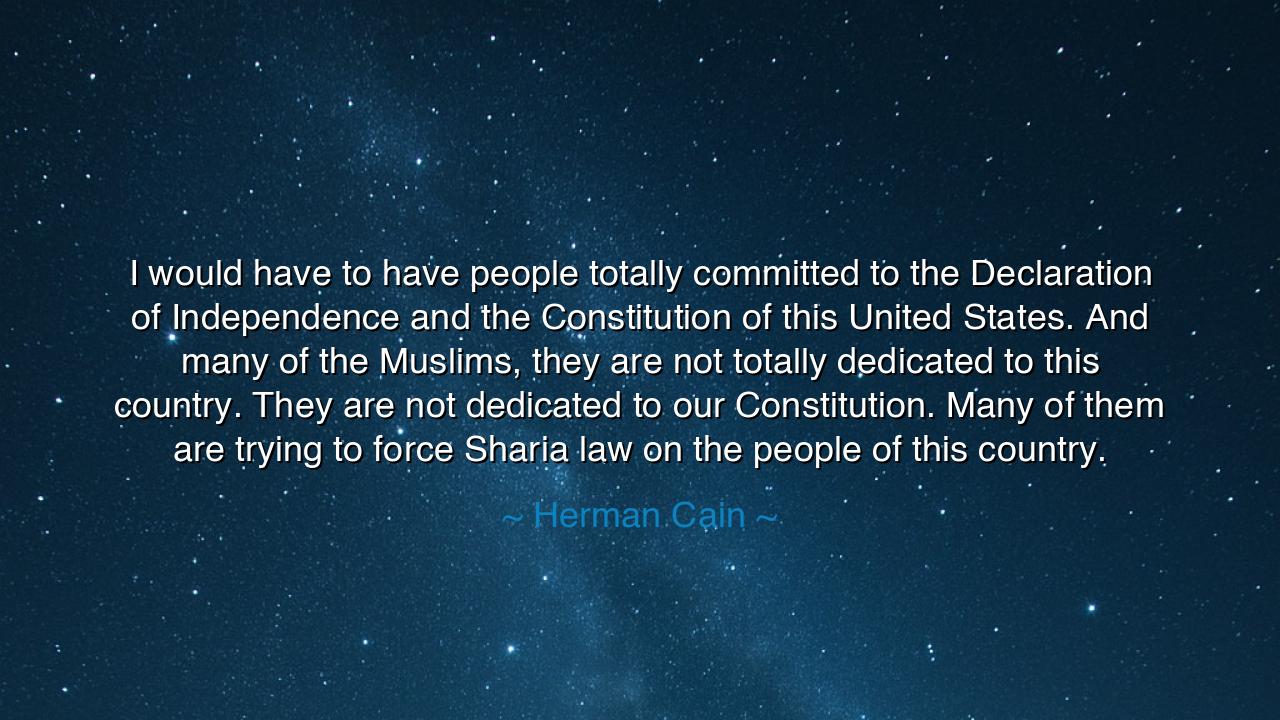
I would have to have people totally committed to the Declaration
I would have to have people totally committed to the Declaration of Independence and the Constitution of this United States. And many of the Muslims, they are not totally dedicated to this country. They are not dedicated to our Constitution. Many of them are trying to force Sharia law on the people of this country.






Hear now the words of Herman Cain, a man of business and conviction, who once declared: “I would have to have people totally committed to the Declaration of Independence and the Constitution of this United States. And many of the Muslims, they are not totally dedicated to this country. They are not dedicated to our Constitution. Many of them are trying to force Sharia law on the people of this country.” These words arose in a time of fear and division, when the hearts of men were stirred by the tension between loyalty and liberty, between faith and nation. His statement, fierce and controversial, speaks not only of politics, but of the ancient struggle between unity and mistrust, between the defense of principle and the danger of prejudice.
At its heart, Cain’s cry is a plea for commitment—for the steadfast devotion to the founding ideals of independence, freedom, and the Constitution, that sacred covenant between the people and their government. The Declaration of Independence was more than parchment and ink—it was a proclamation of human dignity, of the right to choose one’s destiny without tyranny. The Constitution, too, was no mere law, but a living framework designed to guard liberty for generations unborn. To Cain, the truest citizen is not one born upon the soil, but one whose spirit is bound to these principles, who honors the ideals that make freedom possible.
Yet, his words also carry the shadow of suspicion—the belief that some among us, because of creed or custom, may not share this devotion. Here lies both a warning and a danger. For every age must guard its freedoms, but also guard its justice. History shows that when fear governs judgment, the very liberties we seek to protect may crumble beneath our own hands. The ancients taught that virtue lies in balance: the courage to defend, tempered by the wisdom to discern truth from fear.
Consider, then, the story of the Roman Republic, whose founders prized loyalty above all things. In its later years, when enemies pressed at its borders, suspicion turned inward. Citizens accused citizens; strangers were labeled traitors; laws of liberty became tools of persecution. The Republic, once glorious, withered not by the strength of its foes, but by the corrosion of its own trust. In its fall, we see the echo of Cain’s dilemma: how to preserve unity without destroying the diversity that gives life to a nation.
And yet, Cain’s concern also speaks to a truth that must not be ignored: that the blessings of freedom can only endure if those who live beneath them believe in them. The Constitution is not self-sustaining—it lives only through the hearts of those who uphold it. A nation divided in loyalty cannot stand, for its foundation is weakened by doubt. So, too, the ancients warned that a city without shared virtue is like a house built upon sand. Thus, while fear must not rule us, vigilance must not forsake us. For every citizen bears the sacred duty to defend the laws that protect all.
The lesson, then, is twofold. First, to love one’s country is to love the principles upon which it stands—not merely in word, but in deed. Second, to honor those principles means extending them even to those with whom we disagree. The Constitution grants freedom of faith, thought, and speech, not as gifts to the loyal few, but as rights to all. To deny them, even in the name of protection, is to wound the very heart of liberty. The ancients would remind us: the truest test of a nation’s greatness is how it treats those it fears.
So, my children, take these words not as condemnation, but as reflection. Let Cain’s fire remind you of the need for commitment—to truth, to freedom, and to justice. But let it also teach restraint, for independence without compassion becomes tyranny, and vigilance without wisdom becomes blindness. Uphold your nation’s laws, cherish its founding ideals, but never forget that the spirit of the Declaration of Independence was born from the belief that all men are created equal. Guard that belief fiercely, for it is the thread that binds liberty to humanity.
And when doubt arises, remember this: a nation is strongest not when it silences its differences, but when it harmonizes them into purpose. True loyalty is not born of fear, but of understanding. Thus, let every citizen, of every creed and color, be called to the same noble task—to uphold the Constitution, to cherish freedom, and to walk together as guardians of the promise made long ago: that liberty shall belong to all who call this land their home.






AAdministratorAdministrator
Welcome, honored guests. Please leave a comment, we will respond soon